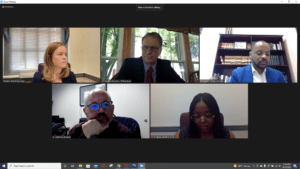

Attending Senate election bills hearing were, clockwise from top left, Sen. Kyle Evans Gay; Sen. Bryant Richardson; Sen. Darius Brown; Senate staffer Charline Ganthier-Cine; and Delaware Elections Commissioner Anthony Albence.
Election bills that would allow mail-in voting and registering at the polls both passed out of committee to the Senate floor Wednesday.
Both would take effect as soon as the governor signs them, meaning they would be in effect for the 2022 primaries and general election.
The two bills, House Substitute for 1 for House Bill 25 on same-day registry, and Senate Bill 320 on voting by mail, drew fairly mild public comments from the usual suspects during the Senate Elections and Public Affairs Committee Wednesday.
The same-day registering bill already has passed the House. SB320 was introduced recently.
The election bills have their roots in the COVID-19 pandemic. When it hit in 2020, many election rules were changed in Delaware, including allowing voters to mail in absentee ballots to avoid exposure to the virus.
That played into a national debate about voting, reflected in Delaware. Democrats favor opening options to elections to allow as many people to vote as possible. Republicans oppose them on grounds of possible fraud.
Sen. Bryant Richardson, R-Seaford, led the Republic charge on the bills Wednesday, questioning many aspects of both bills, with sponsors Sen. Trey Paradee, D-Dover, and Sen. Kyle Evans Gay, D-Brandywine Hundred, answering the questions along with Anthony Albence, commission of elections.
House Substitute 1 for House Bill 25
Paradee pointed out that 21 other states allow people to register on voting day. He said there has been virtually no fraud and that the standards to register same-day are the same ones used to register any other day.
He said the polling stations can communicate by computer with each other and with the state and they can use that to determine a person’s eligibility or to check something seems suspicious.
Albence said anyone wanting to register would have to present the same kind of documentation that anyone else does. It would not slow the voting process because all of that would take place at a help desk at each location, not at the main check-in desk.
Those who show up at the wrong polling place will be given a form and sent to the correct one, he said. Some voters may be provided a provisional ballot, which allows them to vote but the vote only counts if their information is confirmed later. In a non-presidential year, he said, the state gets 45 to 70 of those.
Evelyn Brady, a teacher and member of Alpha Kappa Alpha sorority, which wants to help eliminate voting barriers, said she often asks her high school students to register to vote on the day that they turn 18.
“Try as they might, they forget once they leave the room,” she said during the public comment. “People forget. Mistakes happen. And glitches occur. But with same day registration once these high schoolers turn 18, they can still show up at their polling place, register if necessary and vote without fear of being turned away. No vote should be missed because of a system failure or because someone accidentally let an arbitrary deadline slip.”
Sherry Long, a disabled veteran, pointed out that in 2022, her sister received a form addressed to her husband asking if he wanted to vote by mail. He had been dead eight years, Long said.
She also said that the bill does not have a fiscal note, and she believes it will be costly for the state to set up new systems and train people to make sure that applicants are being truthful.
Senate Bill 320
Senate Bill 320 would allow registered voters to apply online to vote by mail, Gay said. Once requested, ballots would be mailed to them no more than 30 days and no less than seven days before an election.
The final ballots could be mailed back, dropped in boxes in county election offices or delivered by hand to county election offices, she said.
“What we learned in 2020 was that mail balloting was not only possible, but effective and secure and a way to enable many individuals to participate in the voting system,” Gay said.
More than 160,000 voted in the general election using mail ballots, she said.
“I believe and I brought this bill forward because many of my colleagues believe that it is time to provide this access to voting on an ongoing basis,” she said.
Richardson asked to call Janice Lorrah, a Delaware lawyer, as a witness. When Lorrah seemed to start making a public comment, Gay stopped her and asked if Richardson had questions of the witness.
Lorrah said she believes SB320 violated state law, which has been interpreted to mean that voting would be in person. She said passing a bill by majority vote would not do that.
Richardson questioned language in the bill about duplicating ballots and asked whether members of both parties would be present when ballots were moved and how the state can guarantee that drop boxes are secure.
All the drop boxes are under video surveillance, Albence said. Nonpartisan teams will observe everything, he said.
Ballots are reproduced when they are difficult to read, he said. The two copies are kept together and the duplication is noted in the margin so they can be compared, if necessary.
Brady spoke again during the public comment to say that she often didn’t know once she was in a booth who the candidates for some officers were. When she voted by mail, she had time to research after she saw the ballot and was able to make better choices, she said.


Betsy Price is a Wilmington freelance writer who has 40 years of experience.
Share this Post








